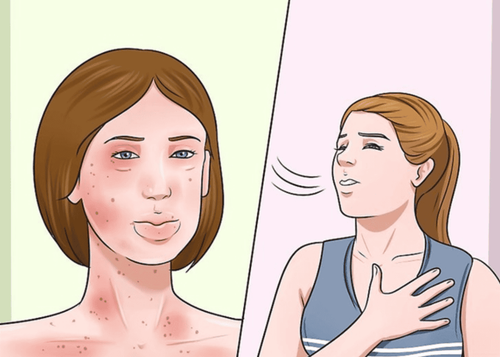This is an automatically translated article.
Being dizzy, dizzy when changing positions often makes many people think they have anemia. This is not wrong, but symptoms of dizziness and vertigo are also symptoms of many other dangerous diseases such as: cardiovascular disease, neurological disease, psychological disorders...
1. What diseases can cause dizziness?
Medically speaking, dizziness and vertigo are two completely separate symptoms.Dizziness is a feeling of lightheadedness, darkening of the face, appearing when you change positions, such as when changing positions from lying to sitting, or from sitting to standing up. This symptom can last from a few seconds to several minutes.
Dizziness is described as when you feel objects spinning around you in many directions or vice versa. This symptom can appear when you change positions or rotate your head. It lasts for a few seconds or can last for many hours continuously causing you to lie still. In severe cases, you will have additional nausea and vomiting.
Each symptom will represent a different pathology. The symptoms of dizziness are caused by a temporary or prolonged decrease in blood flow to the brain. This is a sign of diseases such as anemia, heart diseases (such as heart failure, aortic stenosis, aortic regurgitation, arrhythmia,...), vascular diseases. blood pressure (such as atherosclerotic disease or vasculitis causing stenosis in the internal carotid artery, vascular system of the basilar spine, etc.), hypertension, or hypotension. In addition, when you have a cold, a nervous breakdown, stress, etc., reducing blood flow to the brain (when changing positions) also causes dizziness.
Dizziness is an abnormal manifestation of the vestibular system. The vestibular system is the system that senses the balance of the body, as well as is responsible for perceiving the position of the head in space. When there is a disturbance of the vestibular system, the brain will not recognize the position of the head, leading to dizziness. Dizziness is common in diseases such as: Vestibular disorders (vestibular cochlearitis, paroxysmal paroxysmal positional vertigo, Meniere's disease....) impaired blood supply to vestibular organs (inflammation or atherosclerosis) the brain's posterior circulatory system), stroke, side effects of some drugs....
Dizziness can happen at any age. If these symptoms appear transiently and then go away, with occasional but brief re-occurrence, they are usually benign. You just need to rest and have adequate nutrition. However, when the symptoms of dizziness appear for a long time, from 30 minutes or more, it will often be related to diseases such as chronic anemia, severe atherosclerosis of blood vessels...

Khi bạn bị stress, suy nhược thần kinh cũng có thể gây ra hiện tượng hoa mắt chóng mặt
2. How to quickly deal with dizziness
When you have a dizzy spell, you should stop all work, sit or lie down immediately. The environment around the resting place should be kept cool and quiet. If these symptoms persist and do not improve, you should quickly go to the hospital to be examined by a doctor for advice and early treatment.
How to prevent and treat symptoms of dizziness depends on each specific disease. However, maintaining a healthy lifestyle will help reverse the appearance of these symptoms. Daily exercise, avoiding stress, reasonable and adequate rest helps you to stay away from the above disorders. Eating a variety of foods, eating a diet rich in fresh vegetables and fruits, and drinking enough water are good nutrition methods that help fight off diseases. Diet, living and working needs to be developed based on each person's condition and underlying medical conditions causing dizziness.
3. What drugs do you take for dizziness?
3. 1. Mild dizziness You have symptoms: Dizziness, lightheadedness when lying, sitting, standing, walking, moving abnormally.
How to handle: Do not change position suddenly. Using medicine to treat dizziness combined with acupressure, using glue, folk remedies ... are quite effective.
3. 2. Moderate dizziness and lightheadedness You have symptoms: Feeling uncomfortable and difficult when changing positions or when moving, staggered like a drunk, seeing things are no longer fixed, yes Possible nausea or vomiting
How to handle: In this case, you can drink fresh ginger juice according to the following recipe: Fresh ginger about 10g, cleaned and pounded. Pour about 100-150ml of boiling water into the crushed ginger. Stir well, then decant the water and add a spoonful of sweet enough sugar to drink while still hot. Fresh ginger juice has a very good anti-nausea and vomiting effect.
3. 3. Severe dizziness You have symptoms: Very uncomfortable and difficult to change position (for example, from lying on your back to your side), can't sit up, your mind is compressed. , if you go, you need someone to help you or you will fall, sometimes vomiting violently, watching everything around you spin due to eyeball tremors. You always want to close your eyes, want to find a quiet place to avoid light or noise...
Treatment: You need to take a quick-acting medicine for dizziness, avoid moving or changing positions. If vomiting a lot, drink more ginger juice according to the above recipe and use oresol to combat dehydration. In case the dizziness still does not improve, you need to see a specialist doctor for examination.
Currently, on the market, there are many drugs to treat dizziness that work quickly, regardless of the cause. Groups of drugs for the treatment of vertigo include:
Drugs derived from leucins Antihistamines Anticholinergics In which, drugs for vertigo are leucin derivatives that are evaluated as having the effect of stopping dizziness. Currently, the most powerful active ingredient is acetyl-D, L-leucin. In order to increase the effectiveness in treating dizziness, doctors also recommend that you pay attention to choosing drugs for dizziness from reputable pharmaceutical companies to get the best treatment results.
In short, dizziness and vertigo are manifestations of many different diseases, so for an effective and targeted treatment, you should go to medical facilities for examination and advice. by a specialist in the use of drugs in case of necessity.
Currently, Vinmec International General Hospital has implemented a general health examination package suitable for each subject, age and need. The examination will help the doctor accurately assess the client's health condition to advise on an appropriate diet and rest. All examination procedures are performed by a team of qualified doctors, combined with modern equipment. Therefore, customers can completely rest assured about the results of their examination at the hospital.
Please dial HOTLINE for more information or register for an appointment HERE. Download MyVinmec app to make appointments faster and to manage your bookings easily.













